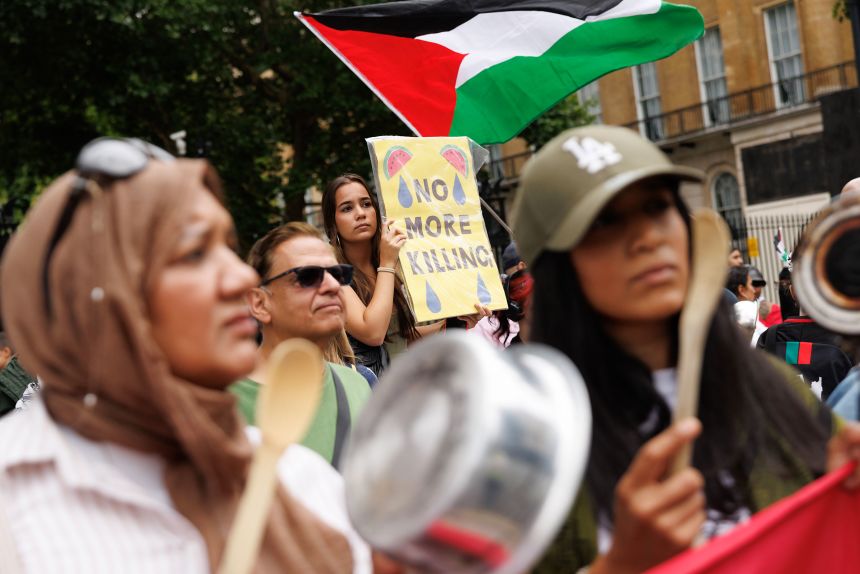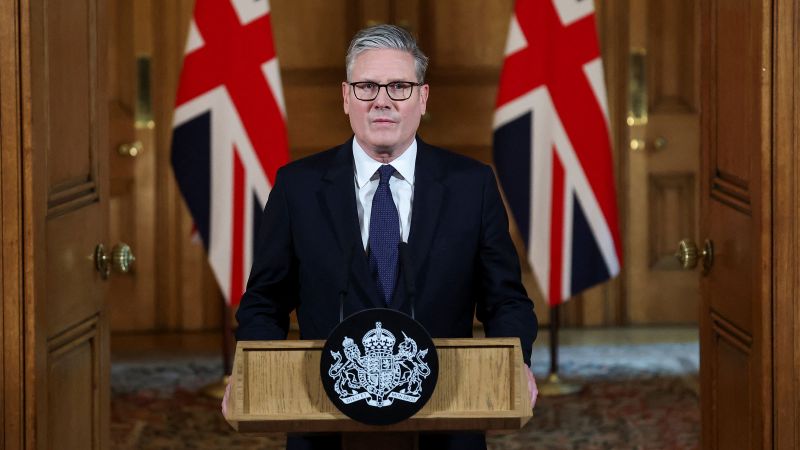British Prime Minister Keir Starmer has said the UK will recognize a Palestinian state in September unless Israel takes “substantive steps to end the appalling situation in Gaza,” as well as meeting other conditions.
“I have always said that we will recognize a Palestinian state as a contribution to a proper peace process at the moment of maximum impact for the two-state solution,” Starmer said in press briefing after a cabinet meeting on Tuesday.
“I can confirm the UK will recognize the State of Palestine by the United Nations General Assembly in September, unless the Israeli government takes substantive steps to end the appalling situation in Gaza, agree to a ceasefire and commit to a long-term sustainable peace reviving the prospect of a two-state solution.”
Starmer convened the meeting one day after the UK leader said the British public are “revolted” by images of people starving in Gaza, speaking alongside US President Donald Trump in Scotland.
Israel’s foreign ministry rejected Starmer’s announcement and said the move constitutes a “reward for Hamas” and harms efforts to implement a ceasefire in Gaza and release the remaining hostages.
Starmer has been facing mounting pressure from within his Labour party to take a tougher line on Israel, made more acute after French President Emmanuel Macron’s recent announcement that France would recognize a Palestinian state in September, becoming the first G7 country to do so.
France commended Starmer’s announcement on Tuesday, with the country’s Foreign Minister Jean-Noel Barrot saying the UK “joins today in the momentum created by France for the recognition of the State of Palestine.”
Scottish First Minister John Swinney also welcomed the “intent” behind the decision but said that Palestinian statehood “must not be conditional and must be backed by sanctions against Israel if the violence continues.”

Starmer explained that the UK’s decision was driven by the “intolerable situation in Gaza” – which he said is getting worse every day – as well as concern that the possibility of a two-state solution is reducing.
“The reason we have announced this in the way we have in relation to the General Assembly in September is precisely because I want to ensure that this plays a part in changing the conditions on the ground, making sure that that aid gets in, making sure that there is hope of a two-state solution for the future,” he told reporters.
Meanwhile, British Foreign Secretary David Lammy reiterated Starmer’s position on Tuesday, saying the UK would recognize a Palestinian state if Israel doesn’t end its military campaign in Gaza.
Speaking at the United Nations, Lammy called on Israel to end the “appalling situation” in Gaza and to commit to a sustainable peace based on a two-state solution.
He warned that the two-state solution was in peril and vowed that the UK would commit to protecting its viability. “There is no contradiction between support for Israel’s security and support for Palestinian statehood,” he said.
Spain, Ireland and Norway recognized Palestinian statehood last year, but other European nations have thus far proved stubbornly reluctant to formally recognize a Palestinian state.
CNN’s Niamh Kennedy and James Frater contributed to this report.
This is a developing story and will be updated.

